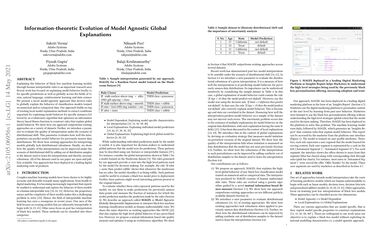Information-theoretic Evolution of Model Agnostic Global Explanations
Explaining the behavior of black box machine learning models through human interpretable rules is an important research area. Recent work has focused on explaining model behavior locally i.e. for specific predictions as well as globally across the fields of vision, natural language, reinforcement learning and data science. We present a novel model-agnostic approach that derives rules to globally explain the behavior of classification models trained on numerical and/or categorical data. Our approach builds on top of existing local model explanation methods to extract conditions important for explaining model behavior for specific instances followed by an evolutionary algorithm that optimizes an information theory based fitness function to construct rules that explain global model behavior. We show how our approach outperforms existing approaches on a variety of datasets. Further, we introduce a parameter to evaluate the quality of interpretation under the scenario of distributional shift. This parameter evaluates how well the interpretation can predict model behavior for previously unseen data distributions. We show how existing approaches for interpreting models globally lack distributional robustness. Finally, we show how the quality of the interpretation can be improved under the scenario of distributional shift by adding out of distribution samples to the dataset used to learn the interpretation and thereby, increase robustness. All of the datasets used in our paper are open and publicly available. Our approach has been deployed in a leading digital marketing suite of products.
PDF Abstract
